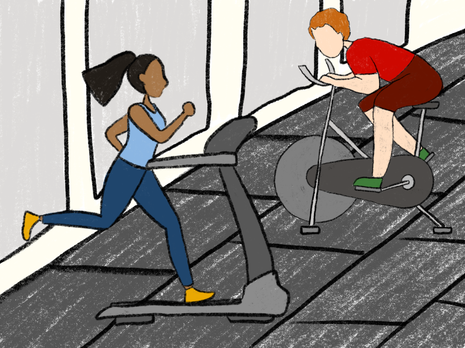In defence of the gym
The gym: a unique space which cultivates devoted obsession in some, yet is reviled by others. Does it reflect all that is wrong with our society or could it be part of the antidote?

I enjoyed reading Maia Livne’s recent article on gym culture. It is exactly the type of journalism that I enjoy the most – provocative, incisive and painting in those delightfully broad brush strokes that we are seldom encouraged to use in our academic work. So, I commend Maia for stimulating my thinking on all things exercise, even if I disagree with some of her analysis, and especially, her prescriptions.
The intellectual canon from which Livne writes is well founded, harking back to Marx and the accumulative and competitive ideals of capitalist exchange. I am not here to dispute that modern forms of exercise are reflective of the neoliberal Zeitgeist (though this case could be made for all manner of contemporary phenomena). It is apparent that exercise culture is fundamentally catalysed by online adverts proffering bodily aesthetics that are unattainable for most of the population; it encourages the consumption of material goods designed to enable us to become the “best version of ourselves”.
However, such is the wont of Marxist analysis, Livne’s article is high in polemic value but possesses little in the way of real-world solutions. She concludes her article with a call to arms – to abandon “Hot Girl Easter” and collectively rid ourselves of gym membership in favour of pursuits, as yet undefined, which are more conducive to self-betterment. Such an argument is analytically flawed, in that it attributes excessive agency to individuals, implying we can simply emancipate ourselves from capitalism by not participating. Absent a massive epistemic shift (“Gymmers of the World Unite!”), the author cannot expect us to escape the ubiquity of capitalist-informed fitness culture by pretending it doesn’t exist.
“The author cannot expect us to escape the ubiquity of capitalist-informed fitness culture by pretending it doesn’t exist”
In her bid to depict gym culture as a form of false consciousness, the author also fails to mention the myriad health benefits of the gym. In terms of physical health, she compares the pursuit of strength and fitness to global climate change – exploit now and pay the consequences later. This is a lovely analogy, if only it were true. It is correct to insist that we ought not push ourselves beyond our physical limits, but cardiovascular and resistance training are proven methods of maintaining long-term physical health. While it may be true that a three-hour walk is better for the knees than a fast run, under the pressure-cooker capitalist system described by Livne, there is no time for the former and therefore, the latter remains better for one’s health than doing nothing at all.
While some may situate the origins of our generation’s drastic levels of ennui in capitalist exchange, for many the gym provides a welcome mechanism to increase mental wellbeing under such a system. Many do experience mental health pressures associated with maintaining fitness and healthy body image, but to suggest unilaterally that you should “bid your gym card adieu” ignores the complexity of the issue.
The implication that there is (“probably”) a causal relationship between the youth sex recession in the West and the increase in exercise is massively reductive and negates the myriad dynamics that fuel this phenomenon. In short, we will not simply start shagging one another again if we quit the gym, as the author preposterously implies.
“The collective aim should be to detoxify gym culture, as opposed to abandoning it altogether”
It is not a universal truism that gyms are Kafkaesque (or Brooker-esque, in Livne’s terms) spaces where individuals atomically and masochistically pursue self-betterment. I have witnessed forms of great comradeship (I use this word with tongue firmly in cheek) in the gym and have left feeling satisfied both in terms of physical and social output. Indeed, for every sterile GloboGym that exists, there is also an Average Joe’s, a place where people can come together in a community spirit to train and enjoy one another’s company. And, while I recognise this reality is inherently gendered (perennially high levels of harassment diminish the social worth of gyms for women), there can be no doubt that some of the forms of exercise maligned by Livne can be a source of social benefit for many who participate — just ask my mother after her Saturday morning ParkRun.
However, it would be churlish of me to criticise her article without offering some contentions of my own. Livne is right to point out how personal fitness has become inherently competitive – perhaps it is time to turn off Strava and de-mediatise our exercise regimes, to prevent recreational activity becoming another form of competitive stress. Excessive sharing of gym achievements (coupled with pictures) on social media may be a legitimate means of self-expression, but contributes to the kind of social pressure that may harm, rather than inspire, followers. Lastly, the self-surveillance associated with exercise and calorie tracking may be a harmful side-effect of a biopolitical age in which fatness is heavily securitised. As such, we ought to weigh-up the benefits continual self-monitoring has on physical health against the mental harm such a process may facilitate (especially with regards to eating disorders) and the exploitation it facilitates through data extraction.
Things are not as zero-sum as Maia makes out. Even if gym culture is symptomatic of what the author believes to be a flawed capitalist system, to suggest that we abandon the gym is to ignore the positive effect gyms have on everyday wellbeing under such a system. Ultimately, the collective aim should be to detoxify gym culture, as opposed to abandoning it altogether. Or, to situate things in Marxian terms, we need evolution not revolution.
 News / Caius mourns its tree-mendous loss23 December 2025
News / Caius mourns its tree-mendous loss23 December 2025 Comment / Yes, I’m brown – but I have more important things to say22 December 2025
Comment / Yes, I’m brown – but I have more important things to say22 December 2025 News / Cambridge welcomes UK rejoining the Erasmus scheme20 December 2025
News / Cambridge welcomes UK rejoining the Erasmus scheme20 December 2025 News / CUP announces funding scheme for under-represented academics19 December 2025
News / CUP announces funding scheme for under-represented academics19 December 2025 Interviews / Politics, your own way: Tilly Middlehurst on speaking out21 December 2025
Interviews / Politics, your own way: Tilly Middlehurst on speaking out21 December 2025










